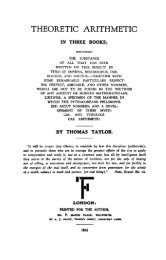Perl - The Good of the Intellect.pdf - Platonic Philosophy
Perl - The Good of the Intellect.pdf - Platonic Philosophy
Perl - The Good of the Intellect.pdf - Platonic Philosophy
Create successful ePaper yourself
Turn your PDF publications into a flip-book with our unique Google optimized e-Paper software.
<strong>The</strong> <strong>Good</strong> <strong>of</strong> <strong>the</strong> <strong>Intellect</strong> 37<br />
<strong>the</strong> result would be sheer anarchic chaos: “For if [one] attributes to chance <strong>the</strong> nature<br />
which takes away <strong>the</strong> ‘happened to be’ from <strong>the</strong> o<strong>the</strong>rs, wherever will <strong>the</strong> being<br />
which is not by chance come to be?” (VI.8.10.5–7). <strong>The</strong> <strong>Good</strong>, as unconditioned<br />
condition, invisible as pure light ra<strong>the</strong>r than as darkness, “takes away” whylessness<br />
from all things. <strong>The</strong> <strong>Good</strong> itself is “without why” just because it is <strong>the</strong> “why” for all<br />
things: “And <strong>the</strong> question ‘why?’ seeks ano<strong>the</strong>r principle; but <strong>of</strong> <strong>the</strong> principle <strong>of</strong> all<br />
<strong>the</strong>re is no principle,” (VI.8.11.8–9), and again, “It is <strong>the</strong> source <strong>the</strong>refore <strong>of</strong> being<br />
and <strong>the</strong> why <strong>of</strong> being” (VI.8.14.32). <strong>The</strong> <strong>Good</strong> beyond intelligibility is thus not a<br />
denial <strong>of</strong> or alternative to rationality, but ra<strong>the</strong>r “<strong>the</strong> principle <strong>of</strong> all reason and order<br />
and limit” (VI.8.10.12–13). Being as intelligible, <strong>the</strong>refore, is not over against or<br />
apart from an unintelligible <strong>Good</strong>. Ra<strong>the</strong>r, it is precisely as intelligible that being<br />
is <strong>the</strong> articulated manifestation <strong>of</strong> <strong>the</strong> <strong>Good</strong>, and hence only in <strong>the</strong> intellectual apprehension<br />
<strong>of</strong> being can <strong>the</strong> transcendent <strong>Good</strong> be encountered.<br />
<strong>The</strong> <strong>Good</strong>, <strong>the</strong>n, is indeed, in Dante’s phrase, “<strong>the</strong> good <strong>of</strong> <strong>the</strong> intellect,” <strong>the</strong><br />
abiding principle and end <strong>of</strong> <strong>the</strong> intellectual apprehension <strong>of</strong> reality. Any attempt<br />
to deploy Neoplatonic transcendence without or apart from intellect—or worse, in<br />
opposition to it—is thus not only historically but philosophically mistaken. To do<br />
this is to risk shutting out <strong>the</strong> timeless and universal and so, for fear <strong>of</strong> <strong>the</strong> modern<br />
conceptual domestication <strong>of</strong> transcendence, to leave us with, on one side, an unintelligible<br />
chaos <strong>of</strong> “factical” experience, and, on <strong>the</strong> o<strong>the</strong>r, an empty transcendence that<br />
reduces to “a nameless wildness.” Without intellect, negative <strong>the</strong>ology does indeed<br />
threaten to coincide with a<strong>the</strong>ism. In Plotinus, on <strong>the</strong> o<strong>the</strong>r hand, we find <strong>the</strong> full<br />
integration <strong>of</strong> a classical, intellectualist metaphysics <strong>of</strong> being-as-form with <strong>the</strong> recognition<br />
that this very ontology demands a ground that is not included within itself.<br />
As Reiner Schürmann remarks, “To pass beyond <strong>the</strong> hypostatic Intelligence thus is<br />
to work through <strong>the</strong> scaffolding <strong>of</strong> reasons and causes, <strong>the</strong> scaffolding <strong>of</strong> etiologies<br />
which makes up metaphysics. Beyond <strong>the</strong> scaffolding, reason loses its wits. <strong>The</strong>n<br />
for once, one may speak peacefully <strong>of</strong> delimited metaphysics.” 28 In <strong>the</strong> intellectual<br />
phenomenology <strong>of</strong> Plotinus we have metaphysics without closure, metaphysics<br />
without totalization, and thus without <strong>the</strong> self-destructive consequences that have<br />
been attributed to modern conceptual rationality. <strong>The</strong> overcoming <strong>of</strong> “modern<br />
objectifying rationalism,” <strong>the</strong>n, calls not merely for a retrieval <strong>of</strong> <strong>the</strong> <strong>Good</strong> beyond<br />
being, but for a recovery <strong>of</strong> full-blown classical intellectualism, which understands<br />
intellect as an intuitive toge<strong>the</strong>rness with being and thus does not set intellect and<br />
transcendence in mutual opposition, but attains radical transcendence in and through<br />
<strong>the</strong> intellectual apprehension <strong>of</strong> being.<br />
Loyola Marymount University<br />
Notes<br />
1. See above all Wayne J. Hankey, Cent ans de néoplatonisme en France: Une brève<br />
histoire philosophique (Paris and Quebec: Vrin and Laval, 2004).
















